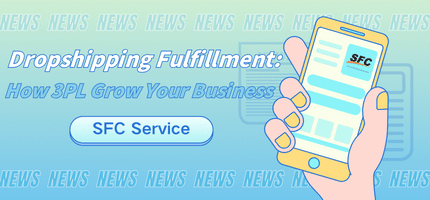Table of Contents
Streamline Dropshipping Fulfillment: How 3PL Grow Your Business
Time: Sep 13,2023 Author: SFC Source: www.sendfromchina.com
With the rapid pace of modernization and digitalization, it is efficiency that differs from a good online store to a great one, whether that is in the supply chain, fulfillment, shipping solutions, or customer service. An efficient e-commerce solution is now more crucial than ever.
Streamlining your dropshipping fulfillment process is the key to success. If you've ever wondered how to make your business more efficient and cost-effective, you're in the right place. This article will dive deep into the world of 3PL (Third-Party Logistics) and how it grows your dropshipping business.

Related reading:
1. How To Scale Your Dropshipping Business With Fulfillment
2. Dropshipping vs 3PL : How To Choose
3. Temu Dropshipping: The Game Changer In Dropshipping
1. What is dropshipping fulfillment and what is 3pl
What is dropshipping fulfillment
In dropshipping fulfillment, the retailer operates without maintaining inventory. Instead, they transmit customer orders and shipping details to a manufacturer, retailer, wholesaler, or their 3PL partner who takes care of shipping the items directly to the customers. Essentially, the retailer plays the role of an intermediary and makes a profit from the product's price markup.What is 3PL
3PL, or Third-Party Logistics, is a service that can revolutionize your dropshipping game. It involves outsourcing your logistics and fulfillment operations to a specialized company. In simpler terms, it's like having a logistics partner who takes care of the nitty-gritty while you focus on growing your business.2. Why dropshipping fulfillment is important
Dropshipping fulfillment is important for several reasons, making it a valuable approach for many e-commerce businesses:2.1 Low Initial Investment: Dropshipping requires minimal upfront capital compared to traditional retail models that involve purchasing and storing inventory. This makes it accessible to entrepreneurs and small businesses with limited resources.
2.2 Reduced Risk: Since you don't need to purchase inventory upfront, you avoid the risk of holding unsold stock. This can help prevent financial losses, especially if products become outdated or go out of season.
2.3 Wider Product Selection: Dropshipping allows you to offer a broader range of products to your customers without the burden of stocking them. You can quickly add new products to your online store to meet changing customer demands.
2.4 Location Flexibility: You can run a dropshipping business from anywhere with an internet connection. There's no need for a physical storefront or warehouse, providing flexibility in terms of location and operations.
2.5 Scalability: Dropshipping is highly scalable. As your business grows, you can easily increase your product offerings and order volumes without the logistical challenges of managing additional inventory and storage space.
2.6 Time Efficiency: With dropshipping, you can focus on core business activities like marketing and customer service, rather than managing inventory and fulfillment. This can lead to more efficient use of your time and resources.
2.7 Market Testing: Dropshipping enables you to test new products and markets with minimal risk. You can quickly assess which products are popular and which niches are profitable before making significant investments.
2.8 Focus on Marketing and Branding: With the logistics outsourced to suppliers, you can concentrate on building a strong brand, creating compelling marketing campaigns, and providing excellent customer service, all of which are critical for long-term success.
3. Advantages of partnering with a 3pl company
Partnering with a Third-Party Logistics (3PL) company for dropshipping offers numerous advantages that can significantly benefit your business. Here are some key advantages:3.1 Cost Efficiency: 3PL providers have established infrastructure and resources for efficient logistics operations. By outsourcing fulfillment, you can reduce costs associated with warehousing, labor, equipment, and shipping, ultimately improving your profit margins.
3.2 Scalability: As your business grows, 3PL services can easily adapt to accommodate increased order volumes. You won't need to worry about expanding your own logistics capabilities or investing in additional warehouse space.
3.3 Faster Shipping: 3PL companies often have multiple distribution centers strategically located, allowing for quicker and more cost-effective shipping. This can lead to improved customer satisfaction and potentially higher sales.
3.4 Expertise and Technology: 3PL providers specialize in logistics and have access to advanced technology for inventory management, order processing, and tracking. Their expertise ensures efficient and error-free fulfillment.
3.5 Inventory Management: Managing inventory can be complex, but 3PL companies excel in this area. They use sophisticated systems to monitor stock levels, reducing the risk of overstocking or stockouts.
3.6 Focus on Core Competencies: Outsourcing logistics to a 3PL allows you to focus on your core business activities, such as marketing, customer service, and product development. This can lead to improved overall business performance.
3.7 Global Reach: Many 3PL providers have international shipping capabilities and expertise in customs and import/export regulations. This enables you to expand your business globally without the complexities of cross-border logistics.
3.8 Reduced Risk: With 3PL partners handling the fulfillment process, you mitigate the risks associated with shipping errors, damaged goods, and inventory management issues. This can help maintain your brand's reputation.
3.9 Time Savings: 3PL services save you time by taking care of order processing, packing, and shipping. This frees you up to focus on strategic aspects of your business and allows for faster order turnaround times.
3.10 Access to Analytics: Many 3PL providers offer data and analytics tools that can help you gain insights into your supply chain and customer behaviour, enabling data-driven decision-making.
3.11 Customized Solutions: 3PL companies can tailor their services to meet your specific needs. Whether you require additional services like kitting, assembly, or returns processing, they can accommodate your unique requirements.
4. Factors to consider when choosing a 3pl partner
Selecting the right Third-Party Logistics (3PL) partner is a critical decision for your business. To make an informed choice, consider the following factors:4.1 Experience and Expertise: Evaluate the 3PL provider's industry experience and expertise. They should have a track record of successfully handling logistics for businesses similar to yours. Experience in your specific niche can be especially valuable.
4.2 Reputation and References: Research the provider's reputation by reading reviews, asking for client references, and checking for industry certifications or awards. A reputable 3PL partner is more likely to deliver consistent and reliable service.
4.3 Service Offerings: Assess the range of services offered by the 3PL. Ensure they can meet your specific needs, whether it's warehousing, order fulfillment, inventory management, kitting, or custom packaging. The provider should align with your business requirements.
4.4 Technology and Integration: Evaluate the technology and systems the 3PL uses. They should have robust inventory management and order processing systems that can integrate seamlessly with your e-commerce platform or software. Compatibility is crucial for efficiency.
4.5 Scalability: Consider your business's growth potential and whether the 3PL provider can scale their services accordingly. A partner that can adapt to increased order volumes and changing needs is essential for long-term success.
4.6 Geographical Reach: Assess the provider's network of distribution centers and transportation capabilities. Ensure they can efficiently reach your target markets, both domestically and internationally, if needed.
4.7 Shipping Options: Understand the shipping options and carriers the 3PL partner uses. They should offer competitive shipping rates and a range of shipping methods to meet your customers' preferences and delivery speed expectations.
4.8 Cost Structure: Compare pricing models and cost structures among different 3PL providers. Consider factors like fulfillment fees, storage fees, shipping costs, and any additional charges. Ensure the pricing aligns with your budget and profit margins.
4.9 Customer Support: Assess the quality of customer support and communication. A responsive and accessible 3PL partner can help address issues and provide updates promptly, enhancing your overall customer service.
4.10 Returns Handling: Understand how the 3PL manages returns and exchanges. Efficient returns processing is crucial for customer satisfaction, and the provider should have clear procedures in place.
4.11 Security and Compliance: Verify that the 3PL complies with industry regulations and maintains high-security standards for your inventory. This is especially important if you handle sensitive or regulated products.
4.12 Flexibility and Customization: Determine whether the 3PL can offer customized solutions to meet your unique business requirements. Flexibility in services and processes can be a significant advantage.
4.13 Financial Stability: Consider the financial stability of the 3PL partner. You want a partner that can withstand economic fluctuations and continue to provide reliable services.
4.14 Location: Assess the proximity of the 3PL's facilities to your target markets. Closer facilities can lead to faster shipping times and potentially lower shipping costs.
4.15 Sustainability Practices: If sustainability is important to your brand, inquire about the 3PL's sustainability practices, such as eco-friendly packaging options and energy-efficient facilities.
5. SFC--Your Reliable 3PL Partner In China
1. Over 17 years 3PL and order fulfillment experience2. DDP (Delivered Duty Paid) Service
3. All-in-one tracking number
4. API
5. 30 days of free storage
6. No hidden fee
7. Custom packaging
8. Worldwide shipping solutions
FAQs
1. What is the difference between 3PL and dropshipping?
Dropshipping is a business model where you partner with suppliers to fulfill orders, while 3PL is a service that outsources your logistics and fulfillment operations to a specialized company.2. How much does 3PL cost?
The cost of 3PL services varies depending on factors like the volume of orders, services required, and the 3PL provider. It's essential to get quotes from multiple providers to find the best fit for your budget.3. Can 3PL providers handle international shipping?
Yes, many 3PL providers have the capability to handle international shipping. However, it's crucial to verify this with your chosen provider and ensure they have the necessary expertise and infrastructure for global operations.4. Is 3PL suitable for small businesses?
3PL can benefit businesses of all sizes. While it's often associated with larger enterprises, small businesses can leverage 3PL services to streamline their operations and compete effectively.5. What industries benefit most from 3PL services?
3PL services are beneficial for a wide range of industries, including e-commerce, retail, manufacturing, and healthcare. Any business that requires efficient logistics and order fulfillment can benefit from 3PL solutions. Post Views:17229
Post Views:17229
Copyright statement: The copyright of this article belongs to the original author. Please indicate the source for reprinting.
Previous Post
The Most Popular Products and Niches on Aliexpress to Dropship in 2023
Next Post
Seasonal Demand: What It Is and How To Deal with Seasonal Demand Fluctuation
TAGS
Hot Research
Get a Custom China Fulfillment Solution with FREE Storage for 30 Days
 Want to know about our services, fees or receive a custom quote?
Want to know about our services, fees or receive a custom quote?
 Please fill out the form on the right and we will get back to you within a business day.
Please fill out the form on the right and we will get back to you within a business day.
 The more information you provide, the better our initial response
will be.
The more information you provide, the better our initial response
will be.






 TAGS:
TAGS: